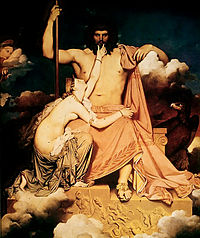Jupiter (god)
From Wikipedia, the free encyclopedia.

In Roman mythology, Jupiter held the same role as Zeus in the Greek pantheon. He was called Jupiter Optimus Maximus (Jupiter Best and Greatest) as the patron deity of the Roman state, in charge of laws and social order. In the vocative case, used when addressing the god, Jupiter was called Jove.
This article focuses on Jupiter in early Rome and in cultic practice. For information on mythological accounts of Jupiter, which are heavily influenced by Greek mythology, see Zeus.
The name of the god was also adopted as the name of the planet Jupiter and was the original namesake of the weekday that would come to be known as Thursday.
Contents |
Name and titles
| Topics in
Roman Mythology |
||
|---|---|---|
| Roman Mythology | ||
| Important Gods: | ||
|
||
| Legendary History: | ||
| The Aeneid | ||
| Roman religion | ||
| Greek/Roman myth compared | ||
The letter J was not used by the ancient Romans; the name in Latin should therefore strictly be written with an initial I, and more commonly occurs in classical authors with a double p as Iuppiter (ancient pronunciation /'jʊp:iter/). It is an irregular noun (derived from Jovis Pater), the genitive form being Jovis (ancient orthography Iouis, pronounced /'jɒwɪs/) hence the adjectives Jovian and jovial. The name (other ancient forms of which include Diovis, Diespiter and Iovis pater) is cognate with Classical Greek Zeus patēr (Ζεὺς πατήρ) and Sanskrit Dyaus pitar, all derived from Indo-European *Dyeus Phter "sky/god the father". The elements are also cognate with Latin diēs "day" and deus "god", and with Germanic Tyr fater (from which arises the word Tuesday, although Jupiter was equated in Anglo-Saxon times with a different god, Thor, hence Jovis diēs is represented in English as Thursday).
Other Latin gods, such as Dius Fidius and Dis or Dispiter also bore similarly cognate names. Dius Fidius was sometimes considered an aspect of Jupiter, while Dis was considered entirely separate.
Many other Italic tribes invoked their chief divinities under similar names: "Diu-" or "Iuve-". It is historically significant that Mars, an Etruscan god, figures as the father of Romulus, but the Etruscan chief god, Tin, is entirely displaced by Indo-European Jupiter. This usage seems to indicate a founding by Etruscans but a domination by Italics.
Other titles of Roman Jupiter:
- Jupiter Caelestis ("heavenly")
- Jupiter Fulgurator ("of the lightning")
- Jupiter Latarius ("God of Latium")
- Jupiter Lucetius ("of the light")
- Jupiter Pluvius ("sender of rain") See also Pluvius
- Jupiter Stator (from stare meaning "standing")
- Jupiter Terminus or Jupiter Terminalus (defends boundaries). See also Terminus
- Jupiter Tonans ("thunderer")
- Jupiter Victor (led Roman armies to victory)
- Jupiter Summanus (sender of nocturnal thunder)
- Jupiter Feretrius ("who carries away [the spoils of war]")
- Juptier Optimus Maximus (best and greatest)
Jupiter and Roman sovereignty
The several aspects of sovereignty implied by some of Jupiter's titles are made explicit in the legendary history of early Rome (as transmitted, for example, in Plutarch's Roman Lives and the first few books of Livy). Thus the warlike Romulus invokes Jupiter Stator to halt and terrify Rome's enemies, while the peaceful legislator Numa Pompilius has a close relationship with Dius Fidius, who presides over oaths.
Jupiter also stands at the head of the Archaic Triad of Jupiter, Mars and Quirinus. This grouping has been seen as a religious representation of early Roman society, wherein:
- Jupiter stands in for the ritual and augural authority of the Flamen Dialis (high priest of Jupiter) and the chief priestly colleges.
- Mars, with his warrior and agricultural functions, stands in for the power of the king and young nobles to bring prosperity and victory through sympathetic magic with rituals like the October Horse and the Lupercalia.
- Quirinus, from co-viri "men together", stands in for the combined strength of the Roman populus.
Later, during the Imperial period, the emperors Claudius and Domitian adopted traits of Jupiter in their portraiture, to emphasize their sovereignty over the whole world.
Capitoline Jupiter
The largest temple in Rome was that of Jupiter Optimus Maximus on the Capitoline Hill. Here he was worshipped alongside Juno and Minerva, forming the Capitoline Triad. Temples to Jupiter Optimus Maximus or the Capitoline Triad as a whole were commonly built by the Romans at the center of new cities in their colonies.
In language
It was once believed that the Roman god Jupiter (Zeus in Greece) was in charge of dishing out cosmic Justice, and in ancient Rome, people swore to Jove in their courts of law, which lead to the common expression "By Jove," that many people use today.
References
- Article "Jupiter" in The Oxford Classical Dictionary. ISBN 0198606419.
- Georges Dumézil, Archaic Roman Religion. ISBN 0801854814.
- Georges Dumézil, Mitra-Varuna. ISBN 0942299132.


